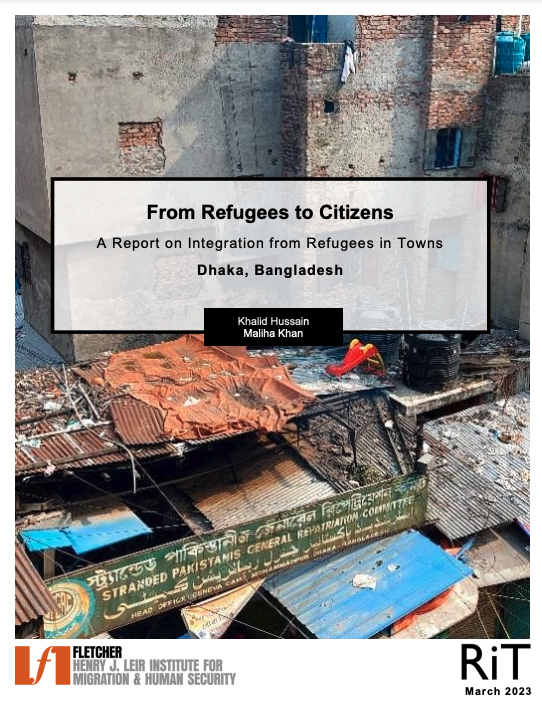RIT Case Report: From Refugees to Citizens–A Report on Integration from Dhaka, Bangladesh
By Khalid Hussain and Maliha Khan
In 2008, Bangladesh’s High Court recognized Bihari refugees’ right to citizenship and requested that their names be added to the voter list as citizens. In doing so, a stateless Urdu-speaking linguistic minority living in refugee camps in the heart of Dhaka city and elsewhere in the country gained citizenship rights 37 years after the war between West and East Pakistan (today Bangladesh) left them stranded. They were no longer refugees, having fought for and won their legal rights largely through the efforts of the community. This case study provides an overview of how the refugee camps in Dhaka came to be and their conditions five decades on, and examines the legal battle from the perspective of one of the authors, who was a member of the Geneva Camp youth group that initiated the case, as well as the barriers that the Urdu-speaking community continues to face in their integration in Dhaka.
The Biharis have been identified locally and officially over the years by various labels, such as stranded Pakistanis, non-Bengalis, Biharis, and as Urdu speakers. The 2003 and 2008 judgments by the High Court confirmed their citizenship and officially recognized them as Urdu-speaking Bangladeshis. However, they and their descendants are still referred to colloquially as “Biharis,” and are seen by many as separate from Bangla-speaking citizens.
In December 1971, Bengalis in East Pakistan won independence after fighting a nine-month war against the Pakistan army. During the war, much of the Urdu-speaking Bihari community sided with West Pakistan with some directly supporting the Pakistan army in attacks against Bengalis. This, in return, led to violence by Bengalis causing several thousand Bihari deaths, according to community estimates. Many Biharis had their homes and property looted and/or seized and were forced to take refuge in temporary settlements, while other more prominent West Pakistani civilians were evacuated alongside the army. Episodic violence against Biharis continued after the war. Despite steady calls for their repatriation, the Pakistani government denied the minority citizenship and did not facilitate full-scale return after a few repatriation efforts in the subsequent decades. This rendered them essentially stateless and left the Biharis stranded. The International Committee of the Red Cross (ICRC) set up Geneva Camp and other settlements developed following the war. Conditions in the camps became increasingly deplorable as the population grew and the camps became “permanent”.
Five decades on, living conditions in the camps have only worsened. Approximately 400,000 Urdu-speaking Biharis live in 116 refugee camps across Bangladesh today, with Dhaka city hosting 32 settlements and camps scattered around 12 districts. Geneva Camp, the largest camp in Bangladesh, is in Mohammadpur in central Dhaka. Another large Bihari settlement is in Mirpur, a northern suburb of Dhaka, which is more deprived than Geneva Camp, with fewer economic opportunities for residents. There are also Bihari settlements in major cities such as Chattogram, Khulna, Mymensingh, Rangpur, and Saidpur.
The Bangladesh government has repeatedly mentioned efforts to rehabilitate Biharis, particularly with regard to providing housing outside the overcrowded camps, but these have not been implemented. Despite gaining mainstream legal recognition, Biharis have been unable to fully integrate into Bangladeshi society and economy—facing barriers to access legal documentation, education and employment opportunities, and insecure land and housing rights. Socially, they remain marginalized in Bangladesh—primarily due to discrimination based on perceived allegiance to Pakistan during and since the war, memories of which still stir strong sentiment in the country.
This case report aims to detail from a firsthand perspective some of the successful advocacy leading to legal rulings which benefited the Urdu-speaking community’s legal standing in Bangladesh as well as highlight continued barriers to integration for residents who have now lived in Geneva Camp in Dhaka city for over five decades.

